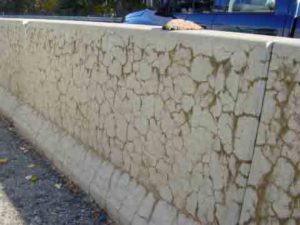ASR
Alkali-silica reaction (ASR) or alkali aggregate reaction (AAR) is commonly referred to as ‘concrete cancer’, a complex chemical reaction that occurs between alkali cations in the hydrated cement paste and reactive silica present in the aggregates.
The reaction produces a gel that expands when in contact with water and generates pressure exceeding the tensile strength of the concrete, rupturing the aggregate. As the expansion continues, the crack propagatesinto the cement paste where the cycle is repeated, the additional cracks allowing for further water infiltration.
The extra moisture exposure results in additional gel formation, expansion, crack propagation and ultimately a large network of cracks, which renders the structure even more susceptible to cracking and providing a path to the embedded steel reinforcement. Ultimately, this leads to reinforcing steel corroding, concrete spalling and the strength loss of the concrete elements.
Recent studies have shown that all aggregates are susceptible to ASR in varying degrees and this has an impact on the lifespan of the structure. Aggregates are generally classified on the scale of their reactivity which varies from *not harmful but expanding slowly (<0,08 in 10 days)) to harmful and expanding rapidly (>0,2 in 10 days). A highly reactive aggregate can be detrimental to an untreated structure within 8-12 years. By extrapolation, *non-harmful and slow expanding aggregates, which are 70% less reactive, could fully propagate and be detrimental to an untreated structure in as little as 30 years.
To produce ASR, moisture must be available to expand the gel formed between the alkali content of cement and the reactive siliceous aggregate. Permeability and the resultant availability of water and subsequent reactivity of the concrete, can be a controlling and mitigating factor for ASR/AAR damage, according to recent studies.
Penetron® Crystalline Technology renders concrete impermeable to water, removing a fundamental part of the reaction and thereby controlling the ASR/AAR. Although the Penetron® Crystalline Technology will not prevent the immediate chemical reaction forming the siliceous gel during the hydration process, the treated concrete’s impermeability to water prevents the expansive gel from reaching its swell potential and thereby inhibits the destructive phase of the ASR/AAR reaction.
Penetron® Crystalline Technology self-heals cracks of up to 0,5mm in a matter of days. Generally the formation of the crystals is faster than the formation of the expansive ASR gel and any cracking caused by the initial formation of the expansive gel, is healed faster than the gel can expand. The crystals remain reactive for the lifetime of the concrete, preventing water ingress and ensuring that critical infrastructure exceeds service life.
